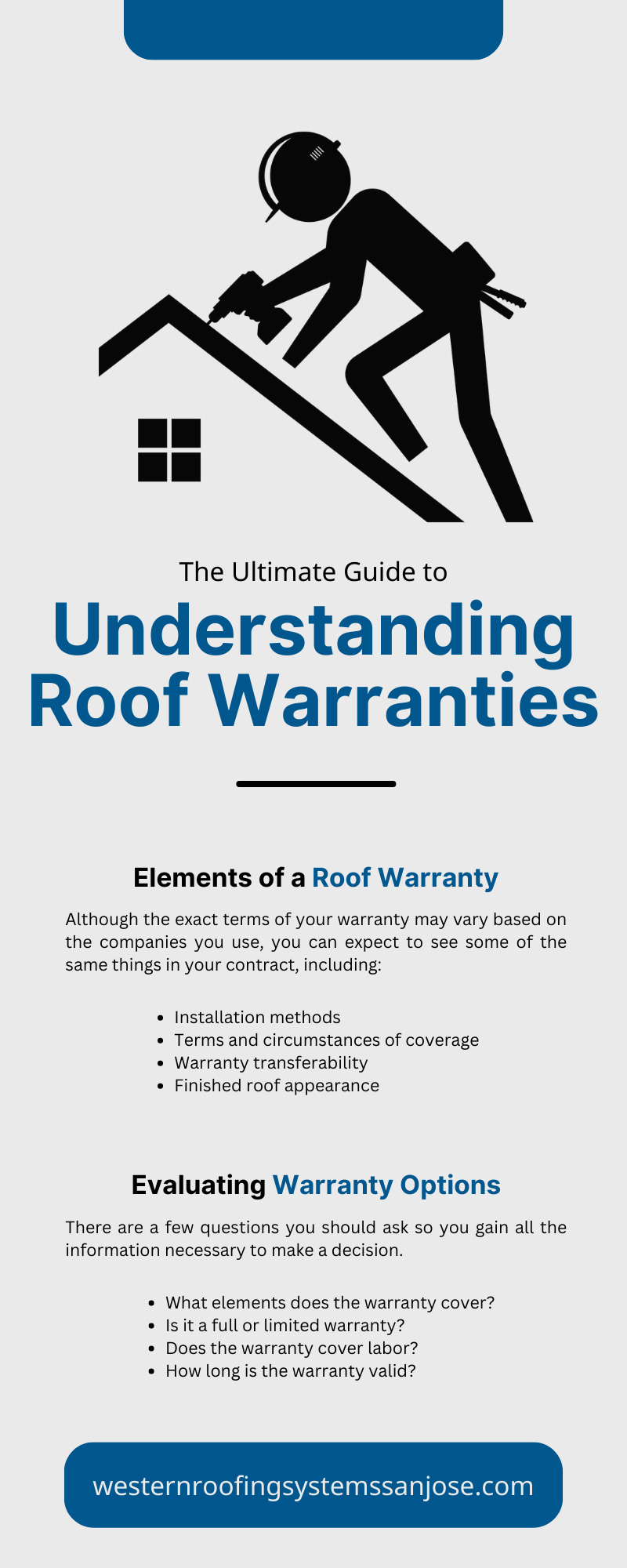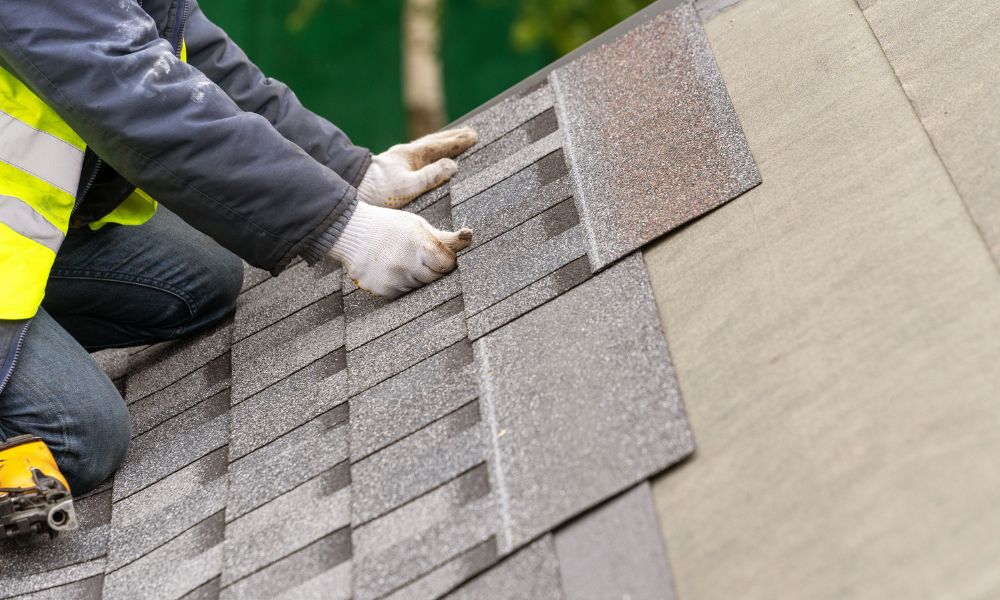You probably already know that many roofing companies promote roof warranties after a new installation, but how do you know if a warranty is necessary? Most people usually fall into one of two categories: those who get warranties on anything they can and those who refuse warranties on everything. No matter which group you’re in, roof warranties can be beneficial since installing a roof is a large investment. Consider the ultimate guide to understanding roof warranties before making your final decision.
Manufacturer vs. Workmanship Warranties
When it comes to roof warranties, there are two different types—manufacturer and workmanship. This is because a roof installation consists of a product and a service, which are the roofing itself and the installation labor. Continue reading to learn more about each warranty type and what they entail.
Manufacturer Warranties
Manufacturer warranties cover shingle or roofing material failure. In other words, these plans protect you from any product recalls or premature material failure and malfunction. Suppose your roofers use a defective batch of shingles on your roof—a manufacturer’s warranty will cover this issue. Additionally, if your roofing fails before the guaranteed lifespan for any reason aside from worker error or storm damage, you have a possible claim under your manufacturer warranty.
Many shingle companies also put out other guarantees on their products to make them more marketable. For instance, some claim that their shingles are wind-resistant or that algae won’t build up on them during an allotted timeframe. That said, a manufacturer’s warranty also covers these guarantees and claims.
Pro Tip
Be sure to keep your product receipts in a safe place in case you need to file a warranty claim.
Workmanship Warranties
Workmanship warranties typically come through the installation company, and they cover issues that come up within a specified period—normally 5–10 years—due to an installation error on the crew’s part. Some of the most common workmanship roofing issues include roof leaks, nail pops, and poorly installed flashing. Every company has different policies and procedures when it comes to their warranties, so be sure to discuss the ins and outs of your coverage before you agree to anything.
Prorated vs. Non-Prorated Warranties
Aside from manufacturer and workmanship warranties, there are also prorated and non-prorated options. Non-prorated warranties provide full coverage without depreciation over time. On the other hand, prorated warranties offer coverage that depreciates over the warranty term. In other words, the warranty provider reduces the amount of money they’ll pay to cover roof failures as your roof ages.
Both of these options are great choices, but a prorated warranty may be best for those who plan to stay in their home for only 5 to 10 more years. If you plan to stay in your home as long as possible, a non-prorated warranty might be best for you.
Elements of a Roof Warranty
Understanding all types of roof warranties is crucial as a homeowner. Some people opt for the one they see the most value in, while others choose to have both options to cover all sorts of potential issues. Although the exact terms of your warranty may vary based on the companies you use, you can expect to see some of the same things in your contract, including:
- Installation methods
- Terms and circumstances of coverage
- Warranty transferability
- Finished roof appearance
Some typical warranty exclusions include:
- Hail and storm damage
- Improper roof repairs or maintenance
- Standing water
- Vandalism
Common Manufacturer Warranty Stipulations
Even though a manufacturer’s warranty is a great resource for protecting your investment, that doesn’t mean you don’t have to do anything in order to hold up your end of the bargain. In fact, some warranties come with specific stipulations the homeowner must uphold for the warranty to remain valid. Here are a few common manufacturer’s warranty stipulations you need to be aware of:
- Registering your warranty: Even if you think your warranty is set to go, it might not be valid unless you register it at the time of installation. In many cases, forgetting to register your roofing warranty with the manufacturer could leave you in a tough situation if something goes wrong with your roof. You can usually register your warranty through the manufacturer’s website, but be sure to ask your installation company how to set it up properly—they can guide you through the process.
- Living at the property: Your warranty is only valid if you own and live at the property where the manufacturer installs the roof. Some manufacturers offer a transferable warranty that you can pass on to the new owner if you choose to sell your home.
- Maintaining your roof: Caring for your new roof is important. Although you have a warranty to take care of any mishaps with the roof, that doesn’t mean you don’t have to maintain it. You should keep up with regular cleanings and inspections to ensure there’s no damage. If you do notice any damage, be sure to repair it according to the manufacturer’s policies and instructions so you don’t void the warranty.
Evaluating Warranty Options
Because there are different factors that accompany each warranty option, you should take your time evaluating your choices to ensure you get the coverage you need. That said, there are a few questions you should ask so you gain all the information necessary to make a decision.
- What elements does the warranty cover? Be sure to ask which roof components are included in the comprehensive warranty. Ideally, you want something that covers everything.
- Is it a full or limited warranty? A full warranty means the manufacturer or contractor should work on a replacement as soon as possible, and you have little to no responsibility as the homeowner. On the other hand, a limited warranty is stricter and may only cover specific aspects or circumstances.
- Does the warranty cover labor? Even if your manufacturer’s warranty covers the cost of materials, it may not cover the cost of repair labor. That said, your contractor may charge additional fees to take care of the repairs.
- How long is the warranty valid? The terms are different for every company, so you must find a contract length that works best for your needs.
Now that you have the ultimate guide to understanding roof warranties, you can contact your asphalt roofing contractor to ensure the warranty you choose suits your needs before the project begins. Warranties can cause some confusion, but protecting such a large investment is always a good idea.



Recent Comments